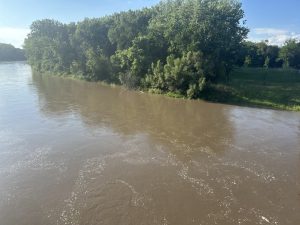Trump EPA rescinds Biden-era decision to expand Iowa’s impaired water list
August 13th, 2025 by Ric Hanson
(An article by Cami Koons, with the Iowa Capital Dispatch) – The U.S. Environmental Protection Agency has rescinded its previous decision to add seven segments to Iowa’s list of impaired waters due to their high nitrate concentrations. In November the agency decided the Iowa Department of Natural Resources’ list of impaired waters only “partially” met the requirements of the Clean Water Act to identify waterways with identified pollutants in excess of water quality standards. The EPA review of the list identified seven additional segments with high levels of nitrate and nitrate plus nitrite. Despite pushback from the DNR, and comments that the EPA had a “patchwork approach” to regulating nitrate across the country, the federal agency finalized the decision in January. According to reporting from the Des Moines Register on Tuesday, the EPA office informed the DNR in July it had rescinded its decision. A spokesperson for the DNR confirmed the action in an email with the Iowa Capital Dispatch.
The original decision highlighted segments of rivers connected to municipal drinking water sources, including segments in the Des Moines and Raccoon rivers which supply water to the Des Moines metro, the Cedar River upstream of Cedar Rapids, the Iowa River near Iowa City and the South Skunk River. EPA said in its November 2024 decision the nitrate concentrations in these segments exceeded safe drinking water standards. The DNR’s director, Kayla Lyon, pushed back against the decision saying the cities that source water from these rivers are all able to supply drinking water within the safe drinking water standards. Lyon also said the agency was “holding Iowa to a very high standard that it does not enforce elsewhere.”

A very full Raccoon River flows under a bridge at Walnut Woods State Park in West Des Moines, June 25, 2025. (Photo by Cami Koons/Iowa Capital Dispatch)
Nitrate concentrations have been a topic of interest for many in central Iowa this summer. In June, Central Iowa Water Works issued its first ever lawn watering ban to account for high nitrate concentrations in source waters, the Des Moines and Raccoon rivers, and to continue to meet demand. The regional water authority kept nitrate concentrations in finished water below the EPA’s drinking water standards thanks to the ban, which was lifted Aug. 7, and to nitrate removal systems at several facilities. Iowa Citizens for Community Improvement Board president Jenny Turner said the EPA’s decision to rescind the segments from the list was “an affront to the health and well-being of Iowans.”
“Issuing this reversal on the heels of Central Iowa Water Works first ever lawn watering ban and consistently high nitrate levels in these very same water segments is tone deaf, appalling, and dangerous,” Turner said in a statement. The release of Polk County’s two-year water quality study has also brought the issue to the forefront for many Iowans. A widely attended presentation on the report has been viewed more than 2,000 times online, and at the event, researchers called for regulation on the agriculture industry for its links to nitrate pollution, which the study highlighted. Tarah Heinzen, the legal director with the environmental group Food & Water Watch said the “water crisis” in Iowa should be a “call to action.”
“Instead, Trump’s EPA is callously turning its back,” Heinzen said in a statement. “The data is clearer than ever that central Iowa is facing persistent, toxic nitrate contamination endangering thousands — and industrial agriculture is responsible.”





